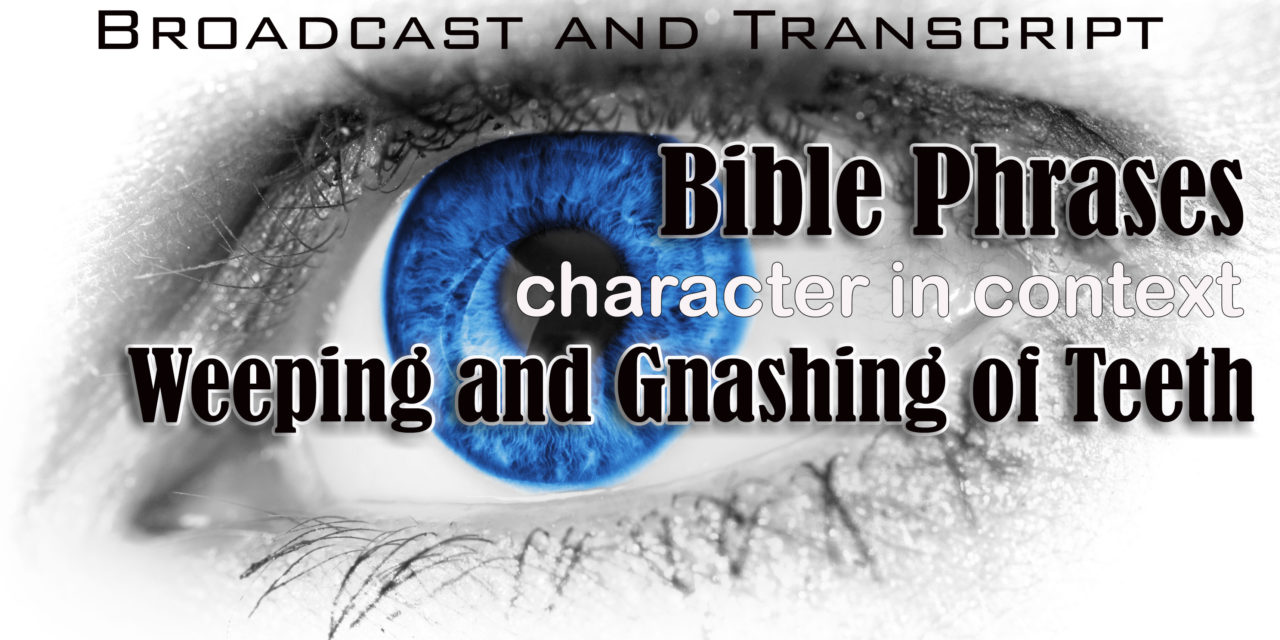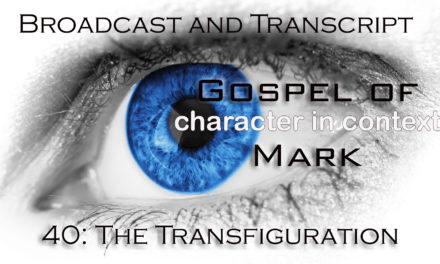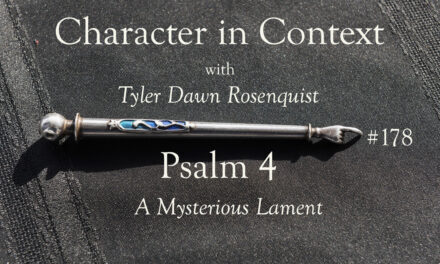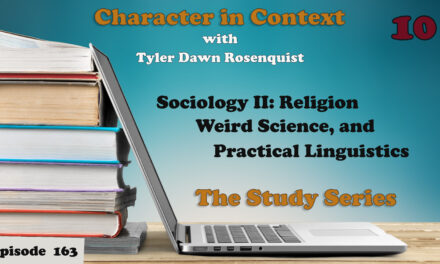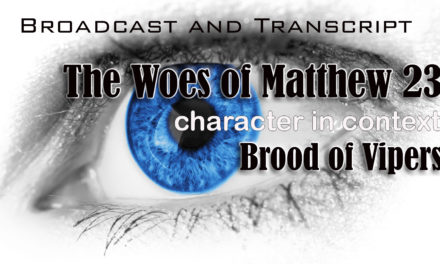The whole concept of “outer darkness” and the “weeping and gnashing of teeth” is so obscured by hell-related imagery that we fail to understand how it would have been received by Yeshua’s/Jesus’s first-century Jewish audience. As this phrase is going to play a big part in the next teaching series on the four “readiness” parables of Matthew 24/25 I decided to make this separate teaching on the “fate worse than death” concept of rejection in the ancient world.
Here’s the transcript, and as usual, not thoroughly edited to please don’t send me comments about mistakes unless they are actually really horrible
************
We all have our areas of stubbornness. One of mine is very simple. If I see a meme that says, “I bet you won’t share it” then I won’t.
No matter how passionately I agree with the contents, I will never share it. I see it, I frown and wrinkle my brow, I get an instant attitude about it, and I keep scrolling. Yes, I hate manipulation that bad. I don’t want to be a “yes” man on anyone’s “outside looking in” recruitment effort, not anymore, no matter how questionable their claimed “outside status” really is.
Oh the other hand, I laugh a lot. One of the types of posts that makes me laugh the hardest is when people post something that says, “I bet Facebook will remove this,” and it pops up in my feed a month later.
These types of posts are kind of all about the same thing–wanting to feign rejection, or wanting a sort of mild and painless rejection on one’s own safe terms, needing to project the idea that one believes things that are unpopular–there is a strange sort of “in-group” vibe to being countercultural in every society and that’s how it manifests on social media.
It really isn’t much different than the punk rock movement of the late ’80s, the greasers of the ’50s, the Hippies of the ’60s/’70s, etc. Every modern Western culture has people who feel the need to publicly project their need to be outside of the norms, to be different. It can be political, or religious, or sexual, or whatever, but a certain segment of modern people always pride themselves in being on the outside–a thought that horrified ancient people. In fact, I recently read an article by a psychologist who identified as gay in his younger years talking about the modern push for young people to question gender and to identify as a whole slew of things and he marks it out as the exact same counter-cultural spirit that has worked in every generation, taking different forms but still being focused on the idea of virtue in non-conformance. So, all you former greasers, hippies, punk-rockers, whatever—look with compassion on the children caught up in the latest wave of the same ocean of rebellion that successfully pulled you in. And, you know what? Have hope for them—there has been an artificial strength in deviance, of one sort of another, for many generations now and it won’t be going away now that we are a technological society less and less dependant on one another—but we have to be positioned properly to catch people once they figure out that it is an empty sort of strength. Just something to think about, and yes, it does have quite a lot to do with today’s topic of outer darkness and the weeping and gnashing of teeth.
Hi, I’m Tyler Dawn Rosenquist and welcome to Character in Context, where we explore the historical context of Scripture and talk about how it bears on our own behavior and witness as image-bearers. You can find my teachings on my websites theancientbridge.com and contextforkids.com as well as on my youtube channels, accessible from my websites. You can also access past broadcasts on my podcast channel characterincontext.podbean.com, which also links to my iTunes channel, and my context books for adults and families are available through amazon.com.
Yeshua/Jesus mentioned it a lot—being cast into outer darkness along with the weeping and gnashing of teeth that went along with it. But what did that mean to His audience? Were they thinking about little deviled ham demons with pitchforks prodding people in the rump for eternity as they burned in unquenchable fire? Or did it mean something societally more horrifying than physical torment?
I want you to imagine a world without modern technology—where you actually need other people constantly and completely for just about everything. No books. No television. No phones. No internet. No grocery stores. No refrigerators. No electricity. No easy way to get anything you want, and no easy way to get what you need either. Everything you have depends on God and others. No bailouts. No welfare. No free healthcare. Heck, no real healthcare at all and just a lot of early death. No life insurance. Very little casual eating of meat without sacrificing a valuable wool or milk producer. No sprinkler system. No way to combat locusts and swarms of insects that want to destroy your crops. No real long-term storage systems. Nothing but you, your land (if you have it), your God and your neighbors.
Bottom line, you would need your family, and all your extended family—even the annoying ones. You would just cope with people’s foibles, their irritating quirks, the busybodies. As a family and as a community you would deal with deviancy as a group, the big stuff, and the small stuff you would learn to ignore—because you needed one another. If you’ve ever watched Little House on the Prairie, you can get a small glimpse of what I am talking about. Unless you wanted to drive the wagon to Mankato in the dead of winter, you needed Mrs. Olsen and her store. Regardless of how insufferable she was, you needed her and so you put up with as much as humanly possible—and she knew that you had to and so she knew she could be a wretched shrew and so could her kids. You couldn’t afford not to put up with her, to assign her the status of Queen Bee of the community. It wasn’t fun, but our lives were not meant to be carefree with no challenges. In our modern obsession with tech, we have created a world where we can just eliminate everyone from our lives who makes us uncomfortable, move far away from family, call absolute strangers who don’t challenge us in any way “friends” and can pretty much live without any “unnecessary” interactions with others. As a result, we are socially stagnant, not maturing like we would if we were in community, all the while fooling ourselves about how mature we are because we have no challenges to prove otherwise. But Carolyn Ingalls found out that there was a price to pay for snapping back at Mrs. Olson—she had to apologize and humble herself because the family needed her to survive. And they needed to be on good terms with the Doctor, and the Reverend, and the Lumber Mill, and the local teacher, etc…and those people needed to be on good terms with the community. It meant that you put up with stuff that we don’t feel we need to put up with anymore. We burn bridges as well as any professional arsonist could ever dream of doing. We just ditch people, congregations, jobs, and communities and move on—but only because we can. We can survive on our own because of the huge safety net strewn beneath us. There’s unemployment, social security, food stamps, cheap fast transportation to go somewhere else, other stores, bank loans so we don’t have to turn to family.
Let’s contrast this with the ancient reality that we find in the Bible, all ancient societies, really. We don’t think it is a very big deal to move away from where we grew up—it has become the norm. Mark and I have lived in nine different cities in the 28 years we have been married and six different states. It’s the nature of his work that we end up going from place to place. We grew up in very small rural towns and got degrees that would never be able to find work in those communities. But my parents also moved around a lot so for me it was not a strange concept to go from place to place. My own son Matthew is itching to move away once his education is complete because, again, this is his norm and he wants to be a cop in Seattle. I know, I know. I am not happy about it either.
But in the ancient world, your clan, your family, your people was the only safety net you had against violence, starvation, etc. Folks don’t realize how serious a deal it was for Abraham to leave all of that and leave Ur to follow God’s command to journey to Canaan. If something, anything, went wrong he had nothing and no one to fall back on. Even for a man as wealthy as Abram this was a terrifying scenario. If you have already listened to Episode 6, The Ancient Community Mindset, or Context for Adults: Sexuality, Social Identity and Kinship Relations in the Bible, then you already have an idea about what I am talking about here. Your family was everything—it was your security, your identity, and your credit rating in the community. If your family had a high level of honor, all doors were open to you—people assumed that you were exactly like your family, that the apple doesn’t fall very far from the tree. If your family was disgraced or shamed, it didn’t matter what a great guy you were because you had a social credit rating of like negative 200. In this kind of world, one bad family member could destroy an entire family’s reputation, which could reduce them to starvation. Hence, we have the commandment allowing a rebellious older son or promiscuous girl to be stoned to death. Although it seems harsh to us, such children were a risk to the entire family’s survival, and they were raised knowing it and it would only be a sociopath or narcissist who would be so selfish as to behave in such a way at the risk of their entire clan. Not living up to the standards of your honor rating was the worst kind of rebellion. It was hateful. Needless to say, they were as different from us as the polar icecaps are from the Sahara desert.
People grew up knowing 100% what was expected of them based on community expectations. They were constantly drilled into them not only by family but by the entire community. No one was taken by surprise. Everyone knew how to be rebellious and everyone knew how to be excellent and it was always achievable. The standards were not outlandish or out of reach. The entire community rewarded you for obedience and punished you for disobedience. You made your parents proud by being exactly what the community expected you to be—I was just that simple. Behavior that benefitted the community was honored and that which hurt the community was shamed. No one tolerated deviancy lightly and evil generally came into and left the community at the highest levels. Only they had enough honor to lend integrity to anything new.
So, you wouldn’t get lower-level people acting like goober heads. If they did it, they would be executed or exiled, one or the other. In the ancient world, it was better to be executed than exiled, much better. I want you to imagine living in this type of society, and not having family or clan. Going to a new place—nothing to your name and not even a family name anymore. What, you think you can get a job and do business if you are such and such son of nobody? You think anyone will give their daughter to you to marry? You think people will trust you and give you the benefit of the doubt? A man without a people was worse than a foreigner, he was beyond a nobody. It was truly an act of God that He gave Moses a wife from an honorable family, just, we have no idea.
You were who you were with respect to your family, clan and people. Yeshua/Jesus of Nazareth, ben Yosef (Joseph) of the tribe of Judah, of the kingly line of David, son of Abraham. That’s who He was when he walked around, before he ever worked a single miracle. He was the son of Joseph from the day Joseph named Him. With that came a tribal affiliation, and an identity as a potential Davidic king (of course, you couldn’t swing a dead cat without hitting a descendant of the Kingly line at that point. Not that they would swing dead cats because they were unclean once they were dead, but that’s not important right now). But he belonged to certain groups and had a certain identity because of His family, and apart from them He was nothing in the eyes of the people. There is a reason that both Matthew and Luke spent a lot of ink on Yeshua’s genealogy and the honorable nature of His family—because without that He was nothing. Miracles would have made Him look like a sorcerer, or a false prophet if he had just popped to life out of nowhere.
This is as true for Yeshua as it would be for any individual in the ancient world. And the worst punishment in the ancient world was rejection. We see the concept of rejection popping up time and time again in the Bible as the chiefest of God’s threats against His people. “Obey me or I will reject you.” “Obey me or the Land will spit you out.” And of course, in the 8th and 6th centuries BCE, that absolutely happened, although we also see the same pattern in smaller ways from the times of the Judges. Rejection/consequences/repentance/reacceptance.
But when Yeshua speaks of rejection and consequences, and especially in the four readiness parables we will be discussing from Matthew 24/25 over the next four weeks, what we don’t see anymore is a chance to repent and be reaccepted inherent in the text. In the OT, the pattern was spoken over the nation with national consequences, but Yeshua speaks repeatedly of individuals. That isn’t to say we can’t screw up and repent and be accepted—I am not saying that. I am just saying that when He speaks of things like outer darkness and the weeping and gnashing of teeth, it reads more in terms of individuals being rejected by the community and being left with nothing, rather than the whole community being rejected by God and still having each other. It is this dynamic that has changed. It’s why it was so much scarier than just being rejected for a season by God because community rejection was permanent (which makes the Parable of the Prodigal Son so shocking to an ancient audience, but we will discuss that some other time).
I want to look at the various references to this in the Gospels and in Revelation so we can see them as the ancients would see them, without our modern ideas of not really needing to have other people to rely on. Remember, no phone, no lights, no motorcars, not a single luxury…nothing to soothe the utter and lonely devastation of being left on the outside of all community for the rest of your life. Not belonging to anything or anyone, having nothing and not being able to get anything in the future. Not being anyone’s son or daughter, husband or wife, parent, friend, having no access to help or the religious life of the community. What would you or could you do in the ancient world if you were cut off from community and all that made life meaningful and bearable?
So, let’s start with Matthew and I am going to just quickly go over the various scenarios:
Matthew 8—a gentile, a Centurion no less, has just expressed faith in Yeshua’s ability to heal his servant from a distance. In context, this follows the sermon on the Mount where Yeshua had just finished speaking about the narrow vs wide gate, true and false prophets and disciples, and the wise and foolish builders. The context is who will and will not be accepted as opposed to rejected. He has spoken about bad trees being cut down and false disciples (even those who work miracles and prophesy) being rejected. The message has been one of acceptance vs rejection and on the heel of that, we see Him healing a leper and a gentile, marveling at their faith and talking about the “sons of the Kingdom” being consigned to outer darkness.
A leper, who in this case was a Jew, was outside society. So was the Gentile. The idea that they could even remotely be in and others would be out was terrifying. It was offensive.
In 7:23 I want you to notice something that will come up again later in the parables, the phrase, “I never knew you.” In each case, it is impossible that they were not “known” by the person saying, “I never knew you.” Of course, they were known, but this expression is an ancient one of absolute rejection and not to be taken literally as though He is saying, “Um, I don’t think we’ve met.” No, this is rejection language, an idiom for utter denial of relationship.
So, the audience would have reacted violently to the thought of being completely exiled from the family of God through Abraham. There truly was an expectation that they were somewhat safe with God solely through genetic ties but Yeshua denies that possibility time and again as does John the Baptist. Being members of the family of God was their primary identity in life, setting them apart from and above the gentiles.
Matthew 22—this is a rejection fest of epic proportions. In this version of the Parable of the Wedding banquet, the people who refuse to attend actually beat the snot out of and outright kill the servants of the King and he actually burns their entire city. It doesn’t get any harsher than that but remember that parables aren’t meant to be taken literally, they don’t take a picture, they paint a picture. The point of the parable is to make a point with a story, even if some of the details don’t make sense or don’t represent reality. This is rejection language, those who refused to attend rejected the King, and so He not only rejected them but sent His army in to obliterate them and then they also destroyed the city. Which in real life would kill a lot of innocent people so we shouldn’t read that much into it. This is about showing a complete and utter and irreversible rejection, in no uncertain terms.
But then we have the people who did come and one was not “ready” which will be our topic for the next four weeks so I am not going into that here—he wasn’t killed. He was rejected and sent out into “outer darkness. While the rest of the community was celebrating with the King, He was outside and could not be a part of it. Hence the desolation of rejection in the ancient world and the weeping and gnashing of teeth. He would undoubtedly be the brunt of community shame for years to come as they would all gleefully relate their festivities and talk about how he didn’t even show up dressed properly and was shamed and expelled.
Matt 25—In the Parable of the Talents, the worthless servant who refused to look after his master’s interests while away was cast outside, into the darkness, while his fellow slaves were enjoying their Master’s happiness. We’ll discuss that in-depth in three weeks so I won’t go into it now, but even a slave has an identity and a place to fit in in that would, and even life as a slave was preferable to them than being utterly alone.
This is my favorite example –Luke 13– 22 He went on his way through towns and villages, teaching and journeying toward Jerusalem. 23 And someone said to him, “Lord, will those who are saved be few?” And he said to them, 24 “Strive to enter through the narrow door. For many, I tell you, will seek to enter and will not be able. 25 When once the master of the house has risen and shut the door, and you begin to stand outside and to knock at the door, saying, ‘Lord, open to us,’ then he will answer you, ‘I do not know where you come from.’ 26 Then you will begin to say, ‘We ate and drank in your presence, and you taught in our streets.’ 27 But he will say, ‘I tell you, I do not know where you come from. Depart from me, all you workers of evil!’ 28 In that place there will be weeping and gnashing of teeth, when you see Abraham and Isaac and Jacob and all the prophets in the kingdom of God but you yourselves cast out. 29 And people will come from east and west, and from north and south, and recline at table in the kingdom of God. 30 And behold, some are last who will be first, and some are first who will be last.”
The reason I like this one the best is that it incorporates so much. The concept of being separated from family is the most obvious here—the patriarchs are dining with gentiles, while some of their own children are being locked out. And not because they aren’t keeping the commandments because almost all of His audience were faithful Jews who kept Torah better than we do. He wasn’t talking to people who were rank sinners. These were people who shared table fellowship, something that no faithful Jew would do with anyone they considered to be an outsider, or any Gentile either—table fellowship was very exclusive—these were people who were teaching. And yet here they are facing rejection in the strongest of terms—separation not only from God but from their own faithful dead, their family, the foundation of their identity. The pain involved with that kind of rejection would have been unimaginable to modern people.
Matthew 25, the parable of the sheep and the goats, we will be discussing that in four weeks, we don’t see this same language but we do get a really stunning primer about what it will take to be an insider vs an outsider. If anything, it is a step beyond mere rejection, but like I said, we will discuss that later.
So, how do we make ourselves rejection proof? How can we be exempted from outer darkness and the weeping and gnashing of teeth? Even though we don’t mind being alone (because with books and tv and mail service and pets that a lot of people value more than human beings and such we aren’t ever truly alone), it would be just as horrible for us to be on the outside of Messiah’s glory looking in from afar. Like we see with the parable of Lazarus and the Rich Man or in Revelation 22:15
15 Outside are the dogs and sorcerers and the sexually immoral and murderers and idolaters, and everyone who loves and practices falsehood.
Everyone who loves and practices falsehood—sure maybe we can assume the others don’t apply to us but I see believers all over social media who just LOVE to spread around rumors about people and pass on fake stories. They don’t check if they are true, they generally don’t even care. Some say they post them just in case they are true. Well, sweetie babe, that is what loving and practicing falsehood looks like nowadays. It’s easier to do and love than we think and it is a poisonous cancer in the Kingdom. Do we really want to be outside looking in alongside the murders and idolaters and sexually immoral? Heck, maybe they don’t want to be associated with cruel gossips. Sin is only pretty in the eye of the beholder.
But I also want to talk about what we can and can’t control. We can control whether we will be assigned to outer darkness by God because He is just and fair. But, there are many believers in this world assigned to an earthly outer darkness for His Name’s sake. Think about what it means to live in India and be one of only ten believers out of a local population of 10,000. Think about truly being an outcast but not having the means to live anywhere else. What it would mean if people wouldn’t buy from you or sell to you because you were the only believers in a city of Shiite Muslims. Starving to death would be the least of your worries. I once lived in a town in Southern Idaho where the Mormon community, which was the overwhelming majority, would shun you and worse if you converted to Christianity. And this wasn’t FLDS cult stuff, this was standard Idaho/Utah Mormonism. Knew a woman where her husband left her for another woman, and her own parents took his side because she was a Mormon and their daughter was now a Christian and they tried to get her committed and take her kids away, and they conspired, along with his bosses, to hide income so she wouldn’t be able to survive and would have to come back to the church. This isn’t just a story, this was something I went through with her as a sister in Christ. That is what outer darkness looks like in the modern world, but let’s look back to the middle of the last century.
Nazi concentration camps, soviet gulags, communist prisons in China today. Imagine being separated from everyone and everything familiar and safe—people live with that horror. It’s outer darkness, and they experience the weeping, the mourning, the gnashing of teeth at the emotional and physical trauma.
But in Messiah we can have shelter from that.
Betsie ten Boom was someone who could not be assigned to outer darkness by the Nazis. Also Darlene Rose Diebler. Richard Wurmbrand and so many others. Check out their stories as I cannot do them justice here.

